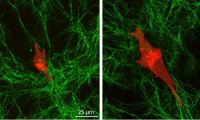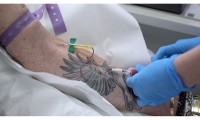-
Pre- and post-surgical immunotherapy-based treatment significantly improved lung cancer outcomes
- Source: drugdu
- 124
- April 18, 2023
-
Engineers find cancer cells have remarkable ability to penetrate deep into their environment
- Source: drugdu
- 133
- April 13, 2023
-
Blood tests may spare cancer patients chemo
- Source: drugdu
- 122
- April 6, 2023
-
New Study Shows Promising Results for Targeted Cancer Therapy
- Source: drugdu
- 175
- March 20, 2023
-
Gilead’s Trodelvy scores accelerated approval in advanced bladder cancer
- Source: drugdu
- 179
- April 15, 2021
-
Researchers identify early changes in BRCA1-positive breast cells
- Source: drugdu
- 215
- March 10, 2021
-
CRUK researchers develop new early-stage rectal cancer treatment
- Source: drugdu
- 570
- December 12, 2020
-
Enhertu granted Priority Review in the US for the treatment of HER2-positive metastatic gastric cancer
- Source: drugdu
- 317
- November 4, 2020
-
Researchers reveal discovery of new cancer drug fadraciclib
- Source: drugdu
- 267
- November 1, 2020
-
Mersana’s Lead Cancer ADC Held Up by FDA for Patient’s Death
- Source: FierceBiotech
- 200
- July 25, 2018
your submission has already been received.
OK
Subscribe
Please enter a valid Email address!
Submit
The most relevant industry news & insight will be sent to you every two weeks.













